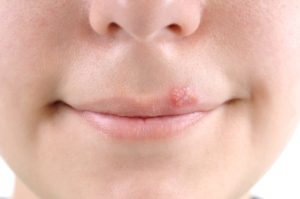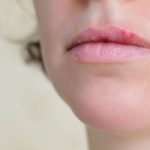
Cold sores (herpes simplex virus) can raise the risk of memory loss and Alzheimer’s disease. Cold sores are not only unsightly to look at and uncomfortable, but they can be a sign of serious health problems as well.
Advertisement
Previous research on cold sores has found that they can be tied to memory loss, but more recent study has made another conclusion about cold sores and your brain.
A cold sore is a form of the herpes simplex virus and can come in two forms – herpes simplex type one (HSV-1) and herpes simplex type two (HSV-2). Type one is the more common of the two forms and usually appears around the mouth. They can burn, cause pain and be itchy, as well as last for quite a number of days.
Although there is no current prevention or cure for cold sores, medications and topical creams can shorten their duration and reduce their frequency.
Cold sores are also highly contagious, so if you have one, try to avoid any close human contact. The majority of the population carries HSV-1 and only when it’s activated does it create the cold sore. Once you do have the virus, you will have it for life.
Cold sores increase the risk of developing Alzheimer’s disease
As I mentioned, previous research has uncovered that cold sores can affect your memory – and not in a good way.
The new research from Umea University in Sweden discovered that being a carrier of HSV-1 almost doubles a person’s risk of developing Alzheimer’s disease.
In their study, researchers followed 3,432 participants for 11 years. Participants who had activated HSV-1 – or experienced reoccurring cold sores – were nearly twice as likely to develop Alzheimer’s disease.
A diagnosis of Alzheimer’s can only be made certain after death. Researchers used neuroimaging techniques to confirm the diagnosis. They were looking for amyloid plaques, which is considered a hallmark of Alzheimer’s.
The researchers also noted that those participants over 60 with the Alzheimer’s diagnosis experienced more immune changes in relation to HSV-1. Although they don’t know why exactly this occurs, or if the cold sores caused the Alzheimer’s, they did find the HSV-1 became more reactive in those in that age group with Alzheimer’s.
Overall, more testing needs to be conducted to reveal an exact link, but the findings do, for now, offer us some insight into cold sores and the brain.
Alzheimer’s remains a mystery
Alzheimer’s disease progresses over time, leaving people forgetful, with changes in their behavior and in their thinking. It’s the most common form of dementia, and although it usually affects people over 65, it is not a normal part of aging.
Although, like cold sores, Alzheimer’s does not have a cure or a sure way to prevent its onset, as research continues, new treatment strategies to manage symptoms are made available.
Keeping your memory sharp when suffering from cold sores
Memory loss and becoming forgetful does not have to be a part of aging; you can take steps to keep your memory sharp. Harvard Health has five tips that can help you protect your memory:
- Managing stress
- Quitting smoking
- Getting a good night’s sleep
- Drinking alcohol in moderation
- Preventing brain injuries
These are important tips, but food can also be a way to achieve good health. You can eat for your brain! A diet full of omega-3 fatty acids, antioxidants that can be found in cherries or blueberries, green leafy vegetables such as spinach or kale, as well as cruciferous vegetables like broccoli are all excellent.
Also flavonoids, the kind found in wine (in moderation!), dark chocolate and tea, can give your brain a boost and help hold on to its memories.
Advertisement
Lastly, playing games that will keep your mind active is great for memory. Completing a crossword or other puzzles, or a memory match-up game, can keep your brain going strong.
Natural remedies for cold sores
If you’ve been stricken by a cold sore, here are some natural remedies you can try to help shorten its duration.
- Use pure vanilla extract.
- Toss your toothbrush and get a new one – your old one has probably become infected, increasing your risk of another cold sore.
- Don’t touch it!
- Use a milk compress.
- Apply hydrogen peroxide.
- Dab on peppermint oil.
- Make a paste with cornstarch and water.
- Apply aloe gel.
- Ice it.
- Apply sunscreen to your lips.
- Begin treatment at the first sign of symptoms.
Although the link between cold sores and Alzheimer’s isn’t fully understood, we are one step further towards knowing more about protecting our memories. The best form of treatment is prevention, so use the above tips to help keep your mind and immune system strong and healthy. If you get cold sores often, it could be a sign of more serious immune issues, so speak to your doctor.
